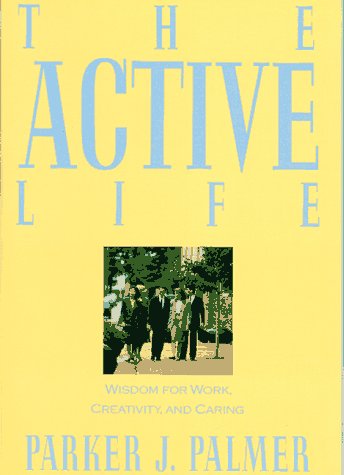Book Notes
 Parker Palmer, The Active Life; Wisdom for Work, Creativity, and Caring (San Francisco: Harper, 1990), 160pp.
Parker Palmer, The Active Life; Wisdom for Work, Creativity, and Caring (San Francisco: Harper, 1990), 160pp.
In the last few decades a fair amount of attention has turned toward the so-called "inner journey" of Christian discipleship, as opposed to the mere externals of our "outer" journey. One thinks, for example, of the writings of Thomas Merton, Henri Nouwen, and Richard Foster. Parker Palmer writes out of this genre, and takes as his starting point the many "monastic metaphors and practices" that inform the inner journey—silence, solitude, contemplation, centeredness, and the like (p. 1). But therein lies a Catch-22. Many of us lead such frenetic and harried lives that trying to appropriate these "inner" ideals becomes practically impossible, an unattainable gold standard, the result being feelings of failure, guilt, and unspirituality. Still, we rightly sense that there is something true and good about whatever it means to lead a "centered" life. Conversely, viewed from the energy of an outwardly active life, is not such silence and solitude really a thinly veiled form of escape, passivity and withdrawal? Or perhaps obsession with action is a diversion and ploy to avoid one's "real" self? Thus, the "tug-of-war" (p. 5) between the active and contemplative life, both of which demand our attention and both of which seem opposed to the other.
To move beyond this stalemate Palmer encourages us to understand contemplation (which he defines as unmasking illusions to reveal reality) and action not as contradictory opposites but as complementary poles of a paradox that we should hold in tension. Further, we all have unique callings from God and should strive to maintain our own integrity, whether that veers toward one pole or the other. After two introductory chapters, Palmer devotes one chapter each to six stories or poems that have helped him to tease out the relationship between inner wholeness and outer activity: (1) "Active Life" by Chuang Tzu, a fourth century BC Chinese Taoist, (2) "The Woodcarver" by Tzu, (3) "The Angel" by the Jewish philosopher Martin Buber, (4) the temptation of Jesus in the desert, (5) the story of Jesus feeding the 5,000, and (6) a poem by the Guatemalan activist Julia Esquivel entitled "Threatened with Resurrection." Palmer is at his best, I think, when he reminds us how much we are obsessed with outcomes, the almost ceaseless efforts we make to prove and justify ourselves, our fears of failure rather than embracing the power that comes from being "dis-illusioned," the task of becoming our own true selves instead of allowing others to define us, moving beyond criticism and praise, and the like. This is the third book by Palmer I have read, and he repeats much of his material, but I have found that many of his stories, and his willingness to share his own personal story, encourage me to develop a centered self out of which I can be the unique, active disciple God has called me to be.


